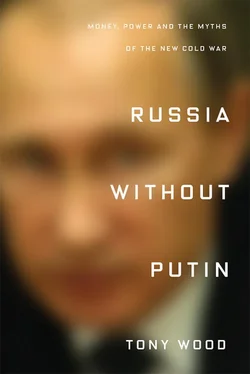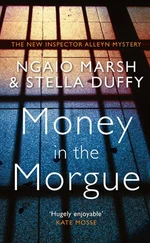St Petersburg was desperately short of money at the time, but it did have plenty of raw materials – timber, oil, metals – so Putin devised a scheme to exchange these for much-needed food imports. But the food never arrived. This gave rise to a scandal that sheds light both on Putin’s methods and on the priorities of the system in which he was operating. {7} 7 The fullest account is in Gessen, Man without a Face , ch. 5.
According to a 1992 investigation led by Marina Salye, a member of the city council, there were serious irregularities in Putin’s scheme, which involved $92 million worth of contracts. This included enormous commissions – kickbacks allegedly worth a total of $34 million. Salye’s report was forwarded to the Russian Account Chamber, with the recommendation that Putin be dismissed, but no further action was taken. This was largely thanks to Sobchak, who apparently insisted the case be dropped. Putin himself later claimed he had been duped by the companies involved. But even on this generous reading, his oversight resulted in millions of dollars’ worth of resources being drained from the city at a time when many of its inhabitants were virtually starving. At worst, he had potentially been involved in a far more deliberate and cynical plan for private enrichment at the public expense. Either way, Sobchak kept him in the job.
A further aspect of this episode is revealing in retrospect: several of the people in the St Petersburg city administration who rallied to Putin’s defence in 1992 went on to play key roles in his regime after 2000. They included future president and prime minister Dmitri Medvedev; Pyotr Aven, who would become a prominent banker; the future justice and interior minister Sergei Stepashin; and the future head of the Russian Security Service (FSB) Nikolai Patrushev. Other figures with whom Putin forged important ties in the early 1990s include Igor Sechin, his aide in the city administration and later head of the state oil company, Rosneft; Matthias Warnig, a former Stasi officer who ran Dresdner Bank’s new St Petersburg branch – the first foreign bank to operate in the city; and the businessmen Yuri Kovalchuk, Gennady Timchenko and Vladimir Yakunin, who all signed lucrative contracts with the city on Putin’s watch. {8} 8 Hill and Gaddy, Mr Putin , p. 159; Myers, New Tsar , pp. 80–81. It seems plausible that Warnig and Putin met in Dresden in the 1980s – as Myers points out, there are group photographs from the time in which they both appear – but the two men deny it.
Personal connections like these are crucial to understanding how Russia works. {9} 9 The Russian sociologist Alena Ledeneva has written the indispensable books on this theme: Russia’s Economy of Favours , Cambridge 1998; How Russia Really Works , Ithaca, NY 2006; and Can Russia Modernise? , Cambridge 2013.
In the Soviet period, informal influence, or blat – translated as ‘pull’ – often dictated access to scarce goods, housing or coveted jobs. Its use was widespread because it was so essential to getting by. What was distinctive about the way blat came to function in the 1990s, however, was that personal connections were increasingly used as a means of making money. Previously a way for ordinary people to get around the inadequacies of the planned economy, they now served the powerful, blurring the lines between state office and private enrichment, and entangling the formal rules of government in a web of informal connections. In Russia, in any contest between legality and personal loyalties, the latter have generally won out. As we will see, Putin’s entire career, from the 1992 food scandal to the present, is in some ways an illustration of this basic rule of post-Soviet politics.
In the summer of 1996, Putin briefly found himself at a loose end after Sobchak failed in his mayoral re-election bid. But Aleksei Kudrin, a former St Petersburg colleague working in Moscow – he would go on to be Putin’s finance minister from 2000 to 2011 – soon recommended him for a post in Yeltsin’s presidential administration, as deputy head of the Presidential Property Management Department. This was a highly sensitive role, placing him not only in charge of a sizeable portfolio of assets but also in the midst of a knot of crooked dealings. For example, one scandal over contracts with the Swiss construction firm Mabetex ultimately led to the arrest of his direct superior, Pavel Borodin, for money laundering in New York in 2001.
A virtual unknown in Moscow before his arrival, Putin proved adept at navigating the byzantine paths of Kremlin politics and, perhaps more important, showed a marked personal loyalty to his bosses and patrons. This quality no doubt smoothed his progress through the ranks of the Yeltsin administration, earning him promotion by March 1997 to head of the presidency’s Main Control Directorate (GKU), which monitored the implementation of executive decisions. In May 1998, he was given another sensitive job in the presidential administration, in charge of the Kremlin’s relations with Russia’s regions. He had barely started when he was switched in July to a much more prominent role: director of the FSB, successor agency to the KGB.
What part had the KGB itself played in Putin’s phenomenal ascent? Putin himself has said that, though he left the agency in 1990 when he returned to Leningrad, he remained in its ‘active reserve’ until August 1991, when a group of hardliners led by the KGB’s chief made a coup attempt against Gorbachev. At this point, Putin claims, he formally resigned. This interval is, of course, when he began working for Sobchak. There is some debate about whether the job itself was arranged for him by the agency, as a kind of mission to supervise one of the country’s rising politicians. Sobchak supposedly knew of Putin’s KGB connections, but thought they might prove useful.
Does this mean that the agency’s shadowy hand was also behind the rest of his career? Putin himself has done little to discourage the idea: in December 1999, not long after he became prime minister, he made a tongue-in-cheek announcement at a dinner commemorating the founding of the Soviet secret police: ‘I would like to report that the group of FSB officers dispatched to work secretly in the federal government has been successful in the first set of assignments.’ Six years later, in December 2005, he told another audience of FSB officers that ‘there is no such thing as a former KGB man’.
Yet these statements are part of an image Putin has deliberately cultivated, and taking them at face value means buying into the mystique he was trying to create. He himself never went especially far within the KGB’s ranks, and was never given the kind of sensitive, high-risk assignments that he had aspired to as a boy; he remained something of an outsider in the Soviet spy world. The main achievement of his time as head of the FSB was a drastic downsizing that cut staff at the organization’s headquarters, the Lubyanka, by a third – scarcely the behaviour of a man bent on restoring the might of his alma mater. {10} 10 Myers, New Tsar , p. 126.
Putin’s KGB training and years of work within the institution would undoubtedly have given him certain skills and encouraged particular habits of mind. But perhaps equally important, in the context of his political career, are the similarities between secret-police methods and the routine practices of post-Soviet business: the use of blackmail and compromising information – kompromat – to apply pressure; manipulation of the legal system; consistent use of threatened or actual violence. In short, many of the features of Putin’s Russia that have been traced to some shadowy KGB conspiracy were widespread under Yeltsin; indeed, they created the environment in which Putin came to power.
Читать дальше












